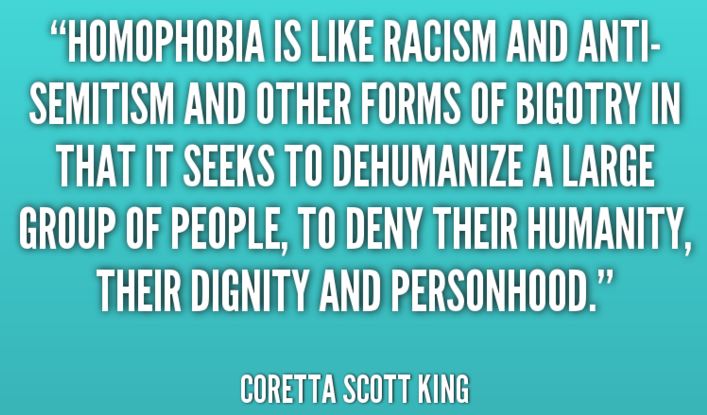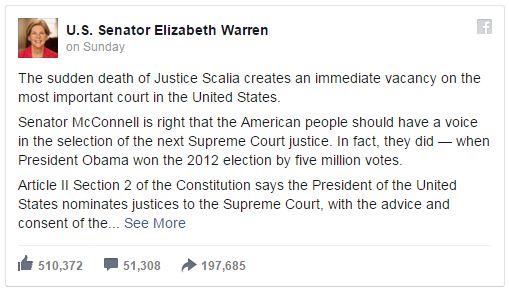When I heard about Supreme Court Justice Antonin Scalia’s death, I didn’t feign sadness. My reaction was too inconsiderate to repeat here, but like many people the justice spent his life trying to suppress — namely women and LGBT people — I shed a tear, but it wasn’t one of sadness. Losing Scalia is one step toward moving past our country’s homophobic and sexist past. It means we’re nearer to a world where people like him aren’t keeping down people like me. So I don’t know why it’s impolite to be happy. The Facebook post that informed me of Scalia’s passing was filled with polite acknowledgements: “Whoa.” “Holy shit. “He spent his life interpreting the Constitution.”…. Displeased with a lack of honesty about the man, I chimed in with “Yesyesyes.” I was immediately slammed for my response — called “classless” and “piggish,” and told I should be “ashamed” of myself. That’s funny — those words are strikingly similar to things Scalia has written about me, my partner, and every LGBT person in the country.

Yes, Scalia may have spent his life interpreting the Constitution, but his interpretations often seemed to have less to do with the law than with a socially conservative and deeply homophobic personal philosophy. Having voted against the LGBT community consistently- with the notable exception of California’s Proposition 8 (on a technicality) - Scalia seldom passed on an opportunity to voice his feelings about those whose only “crime” is living and loving differently.
You see, it’s not just that the justice voted against LGBT rights in every relevant case brought to the Supreme Court — he did, save for the case involving Proposition 8, in which he voted to throw out the antigay measure thanks to a technicality — Scalia always went further, insulting LGBT people and telling us we’re worthy of the nation’s derision.
It’s easy for those of us among the heterosexual majority to err on the side of choosing not to speak ill of the dead. While we may not have agreed with Scalia’s rulings and/or judicial/religious/moral philosophy, few of us could state with clarity that we were materially and directly harmed by Scalia. Those in the LGBT community aren’t so fortunate, having often been the target of Scalia’s direct and patently offensive diatribes unbecoming of a Supreme Court Justice whom we would (inaccurately in Scalia’s case) presume to be an impartial arbiter of the law.
For example, Scalia’s dissent in 2003’s Lawrence v. Texas decision, which invalidated anti-sodomy laws, is in no way indicative of a jurist who believes the law applies equally to all without distinction or prejudice:
Many Americans do not want persons who openly engage in homosexual conduct as partners in their business, as scoutmasters for their children, as teachers in their children’s schools, or as boarders in their home. They view this as protecting themselves and their families from a lifestyle that they believe to be immoral and destructive. The Court views it as ‘discrimination’ which it is the function of our judgments to deter. So imbued is the Court with the law profession’s anti-anti-homosexual culture, that it is seemingly unaware that the attitudes of that culture are not obviously ‘mainstream.’
Evidently, not being “mainstream” makes the LGBT community “less than” and therefore unworthy of the benefits that accrue to heterosexual as “good” and “decent” people.
Though many have chosen to remember Scalia as a “brilliant legal mind,” the fact is that he was a bigot, a homophobe, and exceedingly intolerant of those who fell outside the “mainstream” as he defined it. An argument could be made that Scalia did far more damage than good during his divisive 30-year tenure on the Supreme Court, damage that may well take years, perhaps generations, to undo.
After his death, many pundits and writers danced around Scalia’s hateful legacy and worked to memorialize him as a brilliant legal mind. That would be accurate if you believed the Constitution was a “good, old dead” document that should not be adapted with society’s maturation. He was also genius if you could understand his reasoning that Justice Kennedy’s thoughtful and reasonable opinion in Obergefell v. Hodges — the case that legalized same-sex marriage nationwide — read like “mystical aphorisms of the fortune cookie.” Scalia is also a judicial giant if you can get with the belief that African-American students would excel better at “lesser schools.”
There’s something to be said for respecting someone who’s passed, but for those who can point to instances where their interests have been materially harmed, such generosity of spirit may not be so easy to come by. Given Scalia’s evident and obvious homophobia and disdain for virtually anything concerning LGBT rights, it would stand to reason that the LGBT community might not be resisting the temptation to metaphorically tap dance on his grave.
It would also seem difficult to credibly argue that respect should be paid to a bigot and homophobe so openly and unapologetically disrespectful of those he considered “less than.”
I’d suggest that the author may not have considered his audience in his response to the Facebook post announcing Scalia’s death. The blowback he received for his obvious glee is understandable…if crude and disrespectful. Still, given Scalia’s unbridled antipathy for the LGBT community, one can understand where such glee might originate.
For my part, I still have no plans to take enjoyment from Scalia’s passing…though I’m beginning to understand why some might consider themselves justified in doing just that.

